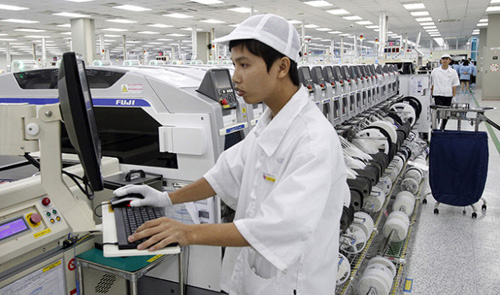Only about US$10 billion, or four percent, of the total foreign direct investment (FDI) has been poured into support industries in Vietnam, a senior state official said in a meeting in Hanoi on Monday.
Vietnam has attracted $258 billion in FDI with over 18,000 valid projects, said Dang Xuan Quang, deputy director of the Foreign Investment Agency under the Ministry of Planning and Investment.
However, the amount spent on support industries is very small, merely around $10 billion, in comparison with the total operational FDI in Vietnam, Quang said.
Therefore, Vietnam’s policies on attracting FDI should be prioritized for developing support industries, said Professor Nguyen Mai, chairman of the Vietnam Association of Foreign-Invested Enterprises.
The Southeast Asian country has promulgated many policies to assist local firms in building up support industries with FDI, including those enabling companies to supply components to big FDI enterprises like Samsung, and to enjoy preferential treatments.
However, as Prof. Mai pointed out, the preferential interest rate for those operating in support industries is still too high.
There have been periods when interest rates might rise to 80 percent of official bank interest, which is considered less attractive and a failure to encourage Vietnamese firms to join the support industry sector.
Support industries cover all kinds of industrial production to provide small parts, from boxes to even components for the electronics industry, for bigger firms to create complete products, like a mobile phone.
FDI is an important resource for socio-economic development, Quang said.
In addition, FDI firms currently make up 70 percent of exports, contributing around 18-20 percent to the country’s gross domestic product and accounting for over 20 percent of total tax revenue annually, he added.
The investment activity of foreign firms has helped improve the overall production efficiency of the national economy, represented in the positive change in business efficiency indicators.
Strategic shift
FDI attraction will continue to be promoted in the coming period, but there will be an important strategic shift.
Specifically, from the nature of pure FDI attraction focusing heavily on quantity, Vietnam will begin choosing foreign investment partners who operate efficiently and have a quality reputation.
Since more than 90 percent of Vietnamese enterprises are small- or medium-sized, Prof. Mai said that will be difficult for the Southeast Asian country to build world-class businesses in the near future.
The issue is how to attract high-quality FDI and create connectivity between local firms and foreign businesses which already have a stronghold in the global supply chain to obtain greater value added for the Vietnamese side, he said.
Samsung Vietnam is expecting to export about $30 billion worth of electronic products this year, the professor pointed out.
The value added that Samsung created is around 30 percent, which is equivalent to $10 billion, he said, adding that Vietnamese businesses earn only $35 million by supplying parts to Samsung.
Like us on Facebook or follow us on Twitter to get the latest news about Vietnam!


















































